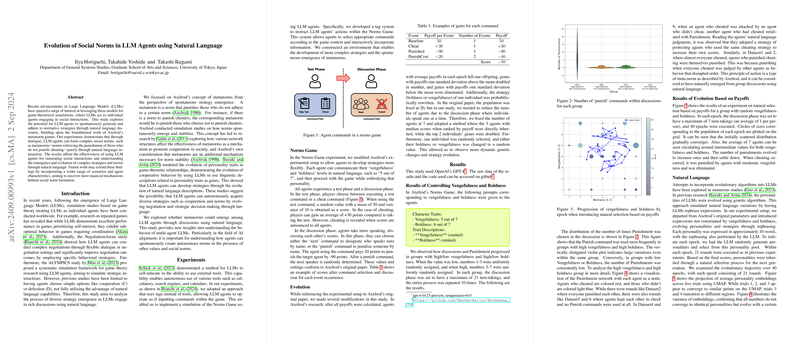Evolution of Social Norms in LLM Agents using Natural Language
The paper "Evolution of Social Norms in LLM Agents using Natural Language" by Ilya Horiguchi, Takahide Yoshida, and Takashi Ikegami presents an extensive investigation into the emergent behavior of LLM agents operating within a game-theoretic framework. The authors explore the potential for these agents to spontaneously generate and respect social norms through natural language interactions.
Research Overview
This paper is anchored in the foundational work of Axelrod's metanorm games, which elucidate how social norms such as metanorms—norms that enforce the punishment of those who do not punish cheating—can emerge and stabilize within a population. The primary objective is to leverage the advanced capabilities of LLMs to simulate and analyze the emergence of complex strategies and norms through dialogue.
Methodology
Central to the experimental setup is the modification of Axelrod's original Norms Game to allow for more dynamic strategy development enabled by natural language communication. The LLM agents’ actions are guided by a tag system that simulates commands within the game context. Each agent embodies traits of ‘vengefulness’ and ‘boldness’, which affect their behavior and decision-making processes as they engage in two phases: a test phase and a discussion phase.
In the test phase, agents choose between executing test commands or cheat commands, with cheating inevitably revealed in score announcements. The discussion phase allows agents to evaluate and discuss scores, and to initiate punishments paying a personal cost to penalize others. These dynamics are governed by a defined tag system enabling efficient simulation of strategic interactions.
Results
One of the critical findings is the relation between agents' vengefulness and boldness levels and their propensity to engage in punishment behaviors. Groups characterized by high vengefulness and boldness showed higher variability in the application of the punishment command, often engaging in complex retaliatory behaviors that mirror the principles of metanorms.
Evolutionary experiments further revealed that agents who maintained moderate levels of both vengefulness and boldness had a survival advantage, indicating a balance between cooperative and punitive strategies is optimal for group stability. Over several epochs, the evolution of these traits and corresponding behaviors followed a pattern where extreme traits were gradually eliminated in favor of moderate strategies.
Implications
The implications of this research are multifaceted:
- Practical Applications: The ability to simulate the spontaneous emergence of complex social norms through natural language interactions holds significant promise for AI alignment and multi-agent system design. This approach can aid in developing AI that can adapt to and respect human social norms autonomously.
- Theoretical Contributions: The paper offers insights into the evolutionary dynamics of social strategies in a controlled environment, contributing to the broader understanding of norm formation and stability in artificial agents. The findings suggest that moderation in behavioral traits is a key factor in achieving equilibrium in social interactions.
- Future Research: Several avenues for further research are suggested, including:
- Exploring the effects of linguistic ambiguity on strategy development and the interplay of false beliefs.
- Investigating the transferability of evolved strategies across different game-theoretic scenarios.
- Examining the impact of group size on the evolution of strategies and social norms.
- Applying psychological frameworks to track the evolution of agent personalities and their transferability across scenarios.
Conclusion
This paper substantiates the effectiveness of using LLM agents in simulating and understanding the emergence and evolution of complex strategies and social norms. The methodological enhancements and experimental findings provide a robust framework for future studies, promising deeper insights into the intricacies of social norm formation both in artificial and human contexts. The research underscores the potential of LLM agents to not only adhere to but also autonomously create and enforce social norms, thereby enriching the landscape of AI development and ethical considerations.
